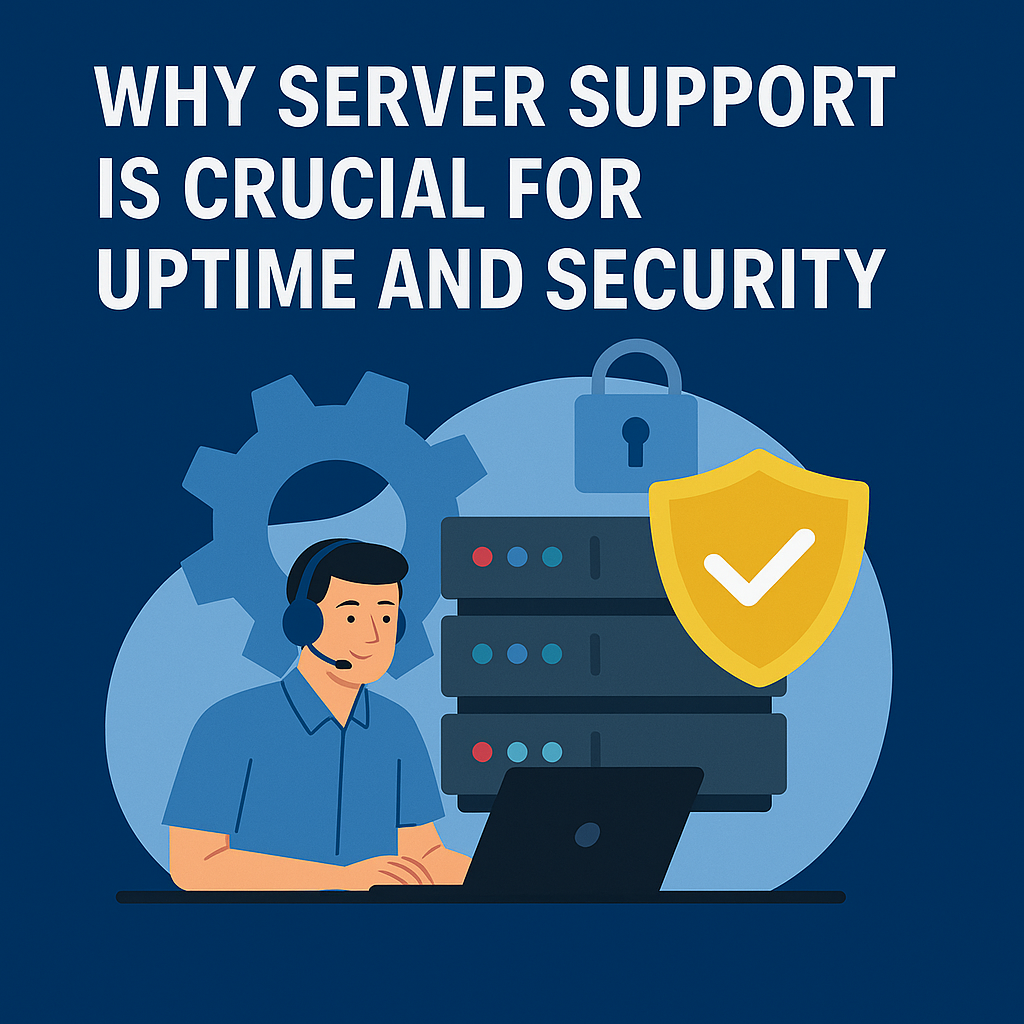5 Signs You Need Outsourced Server Support: A Comprehensive Guide

Servers play a critical role in managing data, applications, and communication across the network. As a business grows, maintaining and supporting this vital infrastructure becomes more challenging. For many companies, outsourcing professional server support is an effective solution to manage complexities, reduce costs, and ensure reliable performance. But how do you know when it’s time to consider outsourced server support services?
In this article, we’ll explore the five key signs that indicate you may need outsourced server support and how making this shift can benefit your business in the long run.
1. Your In-House IT Team is Overwhelmed
As your company expands, so does the complexity of managing your servers. More users, larger databases, and diverse applications demand continuous attention. Over time, your in-house IT support server team may struggle to juggle day-to-day server maintenance, security monitoring, and troubleshooting.
Key Indicators:
- Frequent System Downtime: If your servers experience downtime more often, it may indicate that your team is spread too thin and unable to dedicate enough time to preventive maintenance.
- Delayed Responses to Issues: Slow issue resolution or the inability to address problems promptly could mean your team is overwhelmed by the volume of tasks.
- Staff Burnout: High stress levels, long working hours, and job dissatisfaction are common signs of an overburdened IT department.
How Outsourced Server Support Helps:
By outsourcing support server management, you alleviate pressure on your internal team. An external server management company can handle routine server tasks, freeing up your IT staff to focus on strategic projects that drive business growth. Plus, outsourcing ensures 24/7 monitoring, so problems are detected and resolved before they impact your operations.
2. You Lack Specialized Expertise
Server management requires a wide range of specialized skills, from configuring and optimizing hardware to managing software updates, security patches, and backups. Smaller businesses or organizations in rapid growth phases may not have access to the deep technical expertise required to manage all aspects of IT support server operations effectively.
Key Indicators:
- Frequent Technical Challenges: If you encounter repeated server issues that your team can’t resolve quickly, it’s likely a sign that you lack the necessary expertise.
- Security Vulnerabilities: Data breaches or malware attacks are clear indicators that your servers aren’t being properly protected, possibly due to a lack of up-to-date knowledge on security best practices.
- Performance Bottlenecks: Slow server performance, frequent crashes, or scalability problems may point to inadequate configuration or outdated infrastructure.
How Outsourced Server Support Helps:
Outsourcing gives you access to a team of experts with the experience and skills to handle complex server support services. They bring deep knowledge of the latest technologies and best practices, ensuring your infrastructure is optimized for performance, security, and scalability. You also gain access to certified professionals who are experts in managing various platforms, such as Windows, Linux, or cloud-based servers.
3. You’re Facing Budget Constraints
Hiring, training, and retaining an in-house IT team can be expensive. On top of salaries, businesses must factor in ongoing training, tools, and infrastructure costs. When budgets are tight, outsourcing professional server support can provide significant cost savings without sacrificing quality.
Key Indicators:
- High IT Labor Costs: If IT salaries, benefits, and overtime are consuming a large portion of your budget, outsourcing could be a more cost-effective solution.
- Expensive Technology Upgrades: The cost of upgrading server hardware and software, along with the necessary training, may stretch your budget beyond its limits.
- Unpredictable IT Expenses: If your IT costs fluctuate wildly due to unanticipated problems or system failures, outsourcing can help you control and predict costs better.
How Outsourced Server Support Helps:
With outsourcing, you only pay for the services you need, making budgeting simpler. Outsourcing eliminates the need for large investments in hardware, software, and ongoing training, as external providers already have these resources in place. This model provides a more predictable, scalable cost structure that adjusts as your business grows.
4. Your Business is Growing Rapidly
Growth is a positive sign for any business, but rapid expansion can strain your IT infrastructure, especially if your server capacity isn’t scaling quickly enough to meet demand. Whether it’s an increase in the number of users, data storage needs, or transaction volume, growing businesses often struggle to keep their servers running efficiently.
Key Indicators:
- Increased Server Downtime: As your user base grows, your servers may become overloaded, resulting in frequent outages.
- Slow Response Times: Growing businesses often experience lagging systems due to insufficient server resources.
- Difficulty Scaling: If scaling up your server infrastructure takes too long or becomes too costly, it’s a sign your in-house team may not have the resources to keep pace with growth.
How Outsourced Server Support Helps:
Outsourcing allows you to tap into scalable server support services that grow with your business. External providers can quickly adjust your server capacity, whether you’re dealing with seasonal spikes in traffic or long-term growth. With 24/7 support, you’ll ensure that your server environment is always optimized for performance, reducing the risk of bottlenecks and downtime.
5. You Require 24/7 Monitoring and Support
In the modern business landscape, downtime or server issues outside of regular business hours can be detrimental. However, maintaining an in-house IT team around the clock is costly and often inefficient, particularly for small and mid-sized businesses. Outsourced server support can provide 24/7 monitoring and proactive maintenance, ensuring that problems are addressed as soon as they arise, no matter the time of day.
Key Indicators:
- Downtime During Off-Hours: If your servers experience issues during weekends or nights when your IT staff is unavailable, you may need continuous monitoring.
- Missed Alerts: When server problems are not detected promptly, it often leads to bigger issues that could have been easily resolved with early intervention.
- Client or Customer Complaints: If customers report issues with accessing your website or applications after hours, it’s a clear sign that your current support model isn’t sufficient.
How Outsourced Server Support Helps:
Outsourced providers typically offer 24/7 support server with proactive monitoring to detect and address issues before they escalate. This minimizes downtime, enhances reliability, and ensures that your infrastructure is always functioning at peak performance. Round-the-clock support also improves customer satisfaction, as problems can be addressed immediately, no matter when they arise.
Conclusion
Managing server infrastructure is a complex, resource-intensive task that demands continuous attention, expertise, and investment. For many businesses, outsourcing server support services provides a strategic solution to enhance performance, security, and scalability while keeping costs under control. Whether your in-house team is overwhelmed, you’re struggling with a lack of expertise, or your business is growing rapidly, outsourcing professional server support can provide the flexibility and expertise you need to succeed.
By recognizing these five signs early, you can make the right decision for your IT strategy, ensuring your business stays competitive, agile, and secure in an ever-evolving digital landscape.
FAQs
1. What is outsourced server support?
Outsourced server support services involve hiring an external team to manage and maintain your servers, including monitoring, troubleshooting, and security management.
2. How can outsourcing server support reduce costs?
Outsourcing eliminates the need for costly in-house IT staff, training, and infrastructure investments, providing a more predictable and scalable cost structure.
3. Can small businesses benefit from outsourced server support?
Yes, small businesses often lack the resources to maintain a dedicated IT team. Outsourcing offers access to expert support without the overhead costs of hiring full-time employees.
4. What services do outsourced server support providers offer?
Services typically include 24/7 monitoring, server maintenance, backups, security management, and scalability solutions provided by a server management company.
5. Is server support outsourcing secure?
Reputable providers implement robust security measures to protect your servers, including encryption, firewalls, and regular updates to prevent breaches.
6. How does outsourcing help with business growth?
Outsourced support allows businesses to scale server resources quickly, ensuring that infrastructure keeps pace with growth without incurring significant capital expenses.




No comment